Digitized Content
Gary Fisher Papers, MSP 84
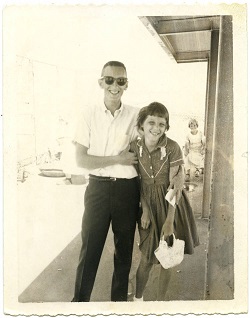
Gary Fisher was a psychologist at the Fairview State Hospital in Costa Mesa, California during the early 1960s. He worked with severely emotionally disturbed children, many with unresolved trauma issues. This collection details Fisher’s work with them, and their experiences undergoing psychedelic psychotherapy. The collection contains articles and reports pertaining to his research, correspondence, and a spiral bound journal. Note: This collection contains content that includes references to self-harm and/or topics that are sexual in nature.
Hollywood Hospital Program and Lecture Notes, MSP 90
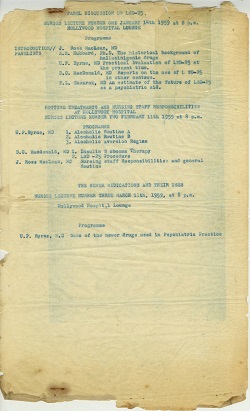
The Hollywood Hospital was a small facility in Vancouver, British Columbia where more than 6,000 therapeutic LSD sessions were conducted for the treatment of alcoholism, anxiety disorders, and depression. The sessions, legal at the time, were carried out by small a team which included Dr. J. Ross MacLean and Al Hubbard. Many of those who underwent treatment were well known actors and cultural figures. It was here that Al Hubbard developed a protocol for establishing a set and setting conducive to therapeutic trips. This document details the professional development activities of those involved in carrying out the treatments, focusing mainly on a patient population of those addicted to alcohol.
Maryland Psychiatric Research Center LSD Professional Training Program Study files, MSP 170

Maryland Psychiatric Research Center was home to the distinguished psychedelic research program led by Albert Kurland, Charles Savage, Walter Pahnke, Sanford Unger, and Stanislav Grof, among others in the 1960s and 1970s. This collection includes records of a study focused on the training of psychedelic therapists. Each file contains some combination of psychological profile reports, personal narratives of an LSD session experience, follow-up survey results about how the sessions affected the subject’s life, and written narratives reflecting on the experience as a whole. Note: This collection contains content that includes references to topics sexual that are in nature.
William Richards collection on Walter Pahnke, MSP 68
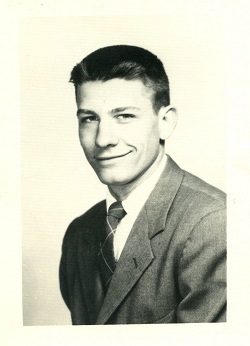
Walter Pahnke was the Director of Clinical Sciences at the Maryland Psychiatric Research Center in the late 1960s, where he conducted sessions with LSD and DPT on terminal cancer patients, alcoholics, and those diagnosed with severe neurosis. His primary research interests included psychopharmacology, psychiatric and ethical issues in the care of the dying patient, and the psychology of religion. He is well-known for designing and conducting the Good Friday Experiment, which was carried out as part of his PhD research. This collection includes some of Pahnke's important academic writings, copies of personal manuscripts, some biographical information, writings by his wife (Eva Sontum Pahnke), and materials memorializing his untimely passing. The materials were collected and donated by William Richards, a close colleague and friend of Walter Pahnke.
Selections from the Dennis and Terrence McKenna papers, MSP 213
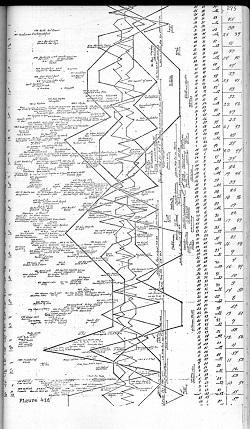
The Dennis and Terence McKenna papers document the lives and intellectual pursuits of ethnobotanist Dennis J. McKenna and radical philosopher, Terence K. McKenna. This selection of digitized content includes a 1972 typescript of their work Shamanic Investigations.
Selections from the Sanford Unger papers, MSP 69
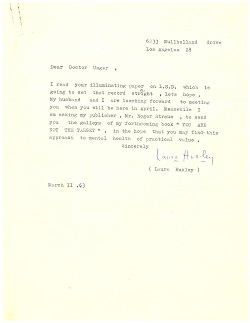
In the early 1960s, Sanford Unger served as a psychologist in the Laboratory of Psychology of the National Institute of Mental Health (NIMH) in Bethesda, Maryland. In 1963, after publishing the highly regarded paper “Mescaline, LSD, Psilocybin, and Personality Change,” he and his colleague Albert Kurland pioneered exploratory research with LSD at the Spring Grove State Hospital in Catonsville, Maryland. Over the next decade, the psychedelic research program at Spring Grove evolved into a major center for research into the therapeutic potential of psychedelics. In 1969, Unger was appointed Chief of Psychosocial Research at the newly founded and highly distinguished state-of-the-art Maryland Psychiatric Research Center. Clinical research projects studied with alcoholic patients, neurotic and depressed patients, and those with terminal cancer, and also included a study on the training of professionals involved in psychedelic psychotherapy. These activities are detailed in his article “The Psychedelic Use of LSD: Reflections and Observations.” This selection of digital content features correspondence with visionaries Aldous and Laura Huxley in the 1960s.
Leo Zeff papers, MSP 74

Leo Zeff was an early and pioneering underground psychotherapist in the San Francisco Bay Area who was first introduced to LSD in 1961, at the age of forty-nine, while working as a Jungian therapist in Oakland. Recognizing its therapeutic potential, he incorporated it (and ultimately other psychoactive substances) into his therapeutic practice. When LSD became an illegal substance in 1966, Zeff continued his psychedelic psychotherapy practice, after much deliberation, in an underground capacity. He recognized that, when administered properly, these substances demonstrated an unparalleled ability to help patients break through repressed emotional material and achieve spiritual insights and personal growth. In the 1970s, Zeff developed a set of guidelines and protocols in regards to patient screening, dosages, set and setting, and a code-of-conduct for guides and participants in psychedelic sessions. These guidelines have proven to be enormously beneficial to others who conduct sessions both underground, and more recently, in an aboveground capacity, as restrictions on psychedelic psychotherapy continue to evolve.
Darrell Lemaire papers, MSP 64

This small collection includes documents created by Darrell Lemaire, a chemist who had a laboratory in a remote part of Nevada where he developed psychedelic compounds that could be potentially useful in a psychotherapeutic setting.